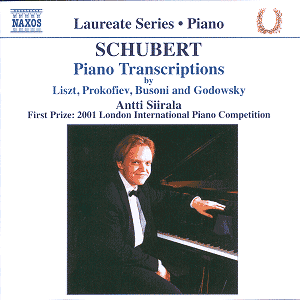Antti Siirala won the World Piano Competition,
London in April 2000. He replaced a finalist who pulled out at
the last moment (Martin Cousin), making his victory all the more
headline-grabbing. Although I reported on the initial rounds,
I did not write at the time about the finals (Seen
& Heard’s
report). I would have loved to, however. Italian Luca Rasca
gave a very involving Brahms First. Siirala, only twenty at the
time, was uninvolving and cold. Although recorded in October 2001,
this disc, part of his winning package, has had to wait until
now to see the light of day.
This is an intelligently presented disc, which
sensibly saves the longest piece until last, Godowsky’s 20-minute
Passacaglia. Siirala provides an eminently listenable experience.
His playing is always carefully prepared; he is careful not to
over-pedal, using the pedal instead to shade passages; and his
tempi are always convincing. He is aided by a fine recording (Potton
Hall is a very highly regarded venue for piano recordings) and
by the strong team of Producer, Andrew Wallton and Engineer, Mike
Clements.
It is nice to hear Siirala play in style for
whichever arranger is ‘in charge’ at the time. This is most obvious
in the Prokofiev Waltzes, which Siirala plays with a consciously
harder edge, but also in the Busoni arrangement of the D major
Overture.
Erlkönig is a very famous arrangement.
Any transcription of this song immediately runs into problems,
of course, as vocally it is much easier to delineate the various
voices (boy, father, Erlking) than it is on the keyboard. Siirala
does well, heightening the drama throughout the course of the
song, only stumbling at the final hurdle, where Liszt piles difficulty
upon difficulty. The song’s dénouement, however, with its
whispered octaves, emerges as a powerful stroke.
It would be nice to be able to summon up more
enthusiasm for the Overture in D, arranged by Busoni. This is
not top-flight Schubert, and very obviously sounds like a piano
reduction of an orchestral original. It also threatens to run
out of steam on more than one occasion. The Godowsky Passacaglia
is another matter, though. If ever a theme lent itself to passacaglia
treatment, it was this one (although would you immediately think
of this while listening to the orchestral original?!). That Siirala
is commendably aware of the grand architecture becomes aurally
obvious as we listen. His concentration is at its highest here,
and Godowsky provides plenty of scope for tonal variety. A pity
the triumphal statements (around 17’30) do not really emerge with
the requisite grandeur.
A stimulating release, of that there is no doubt.
And yes, I would be interested to hear more of this young gentleman.
If at the end of the day sometimes he can sound like a wet-behind-the-ears
competition winner (with all the ‘i’s of his technique dotted,
and all the ‘t’s crossed), there are times when more character
and intelligence come across than I would have given him credit
for all that time ago in 2000.
Colin Clarke
